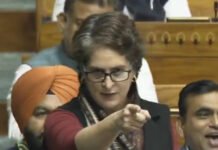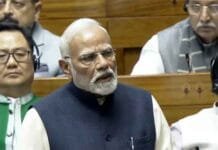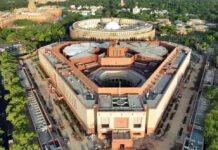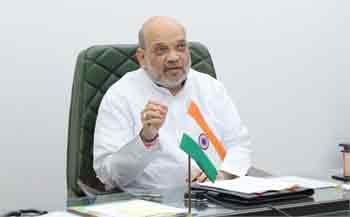The 13th day of the Monsoon Session of Parliament commenced with somber moments in both the Lok Sabha and Rajya Sabha, where tributes were paid to former Jammu and Kashmir Governor Satyapal Malik, who recently passed away, and the innocent victims of the Hiroshima atomic bombing anniversary. Following the tribute, both Houses observed a moment of silence, reflecting on national loss and historical remembrance. Subsequently, both Houses were adjourned for the day amid escalating political tension and disruption.
Uttarakhand Disaster: Prime Minister Modi and Amit Shah Monitoring Relief Operations
BJP MP Ajay Bhatt, representing Nainital-Udham Singh Nagar, raised concerns in Parliament regarding the devastating natural disaster in Uttarakhand, triggered by a severe cloudburst and flash floods. He informed that Prime Minister Narendra Modi and Home Minister Amit Shah are closely monitoring the situation and have been receiving real-time updates on the ground.
According to Bhatt, Chief Minister Pushkar Singh Dhami has already visited the affected regions. Over 120 people have been rescued, and medical attention is being provided. Numerous roads have been washed away, cutting off remote areas and delaying response efforts. Bhatt emphasized the need for clear skies to enable army helicopters to resume airlifts and evacuation efforts. He confirmed that central government agencies, including the NDRF, are actively coordinating rescue operations.
Priyanka Gandhi Demands National Strategy on Natural Disasters
Before the day’s proceedings, Congress MP Priyanka Gandhi Vadra addressed reporters, calling the Uttarakhand tragedy “deeply saddening” and stressed the need for a comprehensive national disaster mitigation strategy. She also referred to similar calamities in Himachal Pradesh and Wayanad, underscoring that recurring natural disasters demand policy-level intervention rather than reactive responses.
Rajya Sabha Uproar: Congress Demands Debate on Electoral Integrity
Congress MP Rajni Patil submitted an adjournment motion in the Rajya Sabha to discuss the “integrity, inclusiveness, and fairness” of India’s electoral process. This motion aims to draw attention to perceived flaws in the Special Intensive Revision (SIR) of the voter list in Bihar, initiated by the Election Commission of India (ECI).
Patil’s call for debate gained support from several opposition leaders, citing recent discrepancies in the voter registration process, especially in poll-bound states. However, no discussion was initiated on this critical issue due to a procedural rejection from the Deputy Chairman.
Jairam Ramesh Questions Rajya Sabha Deputy Chairman’s Decision
Senior Congress leader Jairam Ramesh took to social media platform X to publicly question the Deputy Chairman’s decision to block discussion on the SIR of Bihar’s voter list. He invoked Balram Jakhar’s 1998 precedent, arguing that the Deputy Chairman misused this example to deny debate.
Ramesh strongly asserted that the Rajya Sabha has the constitutional right to discuss any matter, except for the conduct of judges, referencing the clear ruling of the Rajya Sabha Chairman dated July 21, 2023. He described the Deputy Chairman’s move as “arbitrary and politically motivated”, further accusing him of ignoring recent procedural rulings.
Demand for Electoral Process Discussions in Both Houses
Multiple Congress MPs demanded immediate deliberation on electoral transparency. In the Lok Sabha, Manickam Tagore filed an adjournment motion targeting the ECI’s revision processes, while in the Rajya Sabha, Randeep Singh Surjewala used Rule 267 to raise concerns about the erosion of fairness in electoral mechanisms.
Their collective appeal revolves around allegations of selective voter deletion, lack of public awareness, and insufficient safeguards against manipulation. These issues have gained traction due to upcoming elections in sensitive regions.
Concerns Over Judicial Appointments Spark Controversy in Lok Sabha
Congress MP Hibi Eden introduced another adjournment motion in the Lok Sabha, focusing on the recent appointment of a judge to the Bombay High Court, who, according to Eden, formerly served as a spokesperson for a major political party.
Eden questioned the impartiality and independence of the appointment, warning of the dangerous interlinking of judiciary and politics. His motion has added another layer of tension to the already volatile monsoon session.
Sanjay Singh Flags Irregularities in SSC Phase 13 Exams
In Rajya Sabha, Aam Aadmi Party (AAP) MP Sanjay Singh submitted an adjournment motion under Rule 267, calling for a debate on the alleged irregularities in the SSC Phase 13 examination. Singh voiced serious concerns over the integrity of competitive recruitment, stating that students’ futures are being ruined by recurring examination scams.
He demanded a high-level probe and transparency reforms within Staff Selection Commission (SSC) practices. The issue, gaining widespread attention on social media, has further intensified opposition protests.
Multiple Flashpoints Disrupt Parliament Proceedings
The monsoon session of Parliament has been mired in repeated disruptions. Other than a short-lived unity during discussions on the Pahalgam terror attack and Operation Sindoor, both Houses have seen frequent adjournments over various issues.
Prominent among them:
CISF personnel’s alleged unauthorized entry into the Rajya Sabha well
Discontent over the voter list revision in Bihar
Concerns over judicial appointments
Protest over SSC examination scams
Demands for accountability in disaster relief efforts
Each of these concerns has become a flashpoint, with opposition leaders uniting across party lines to challenge the government’s approach on matters related to transparency, accountability, and national security.
Government Shifts Focus to Legislative Business Amid Chaos
Despite opposition protests, the central government is pushing forward with legislative business. Sources indicate that the ruling party is keen on breaking the deadlock and is in active talks with floor leaders to resume debate on key bills.
Union Parliamentary Affairs Minister has been tasked with facilitating a negotiated truce, even as several legislative items remain pending, including:
Digital Personal Data Protection Bill
Public Examinations (Prevention of Unfair Means) Bill
Forest (Conservation) Amendment Bill
The government maintains that these bills are critical to national interest and urges MPs to return to normalcy.
What Lies Ahead for the Monsoon Session?
As the monsoon session heads into its final stretch, questions remain:
Will the opposition relent and engage in structured debate?
Can the government ensure passage of key legislation without further walkouts?
Will the judiciary issue directions on the voter list revision controversy?
How will the SSC scam allegations evolve with mounting pressure from student groups?
The coming days will be crucial in determining whether Parliament can restore decorum and focus on nation-building through consensus, or whether the session will go down in history as one of the most disrupted in recent memory.
Conclusion: A Parliament in Crisis, A Democracy at Test
The 13th day of the Monsoon Session underscores the critical need for dialogue, transparency, and unity in India’s highest democratic forum. As both the government and opposition dig in their heels over key national issues—from electoral reforms and judicial integrity to disaster response and education sector scandals—the Indian Parliament stands at a pivotal juncture. The nation watches, expecting leadership, clarity, and resolution.
















